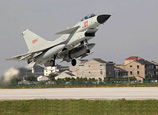
BEIJING, May 6, (ChinaMil) -- Martin Dempsey, chairman of the U.S. Joint Chiefs of Staff, paid a five-day-long visit to China in late April of 2013. During the visit, China and the U.S. held candid exchanges on such sensitive subjects as cyberspace security, the DPRK nuclear issue, the Diaoyu Islands and the South China Sea. This will undoubtedly play a positive role in promoting the development of the relations between the two militaries.
With a view to the future, the U.S. is still in urgent need to change its outdated way of thinking fundamentally in order to build new China-U.S. military relations.
The current strategic positioning of the China-U.S. relations is "cooperative partnership", and the direction for its future development will be "exploring ways to establish new relations between major powers".
An important link in building the new China-U.S. relations as major powers lies in the development of new China-U.S. military relations based on "equality and mutual benefit as well as win-win cooperation".
The China-U.S. military relations have made certain progress in recent years. On a whole, however, the military cooperation between China and the U.S. is still lingering at a low level, with a relative lack of high-level and substantive cooperation as well as a shortage in depth and breadth for dialogues.
Both the Chinese and U.S. military still have a long way to go and a lot of obstacles to overcome in order to create a new type of military relationship.
The current obstacles in reality are the U.S.'s sales of military hardware to Taiwan, the close-in monitoring and surveillance targeted against China by U.S. ships and aircraft, and the high-tech export restrictions placed on China.
Behind these obstacles lies the issue of strategic mutual trust between the Chinese and U.S. militaries, especially when there are always some people in the United States who think that China's military development is not transparent. They cast doubts on the intention of China's military development, and regard China as the U.S.'s biggest rival and challenge in the Asia-Pacific region.
The development of a new China-U.S. military relationship needs to break away from the outdated mindset of "zero-sum" and to establish the concept of cooperative security in the era of globalization so as to take a substantive step in building a new China-U.S. military relationship. Otherwise, it would be very difficult to achieve a big breakthrough in the China-U.S. military relationship, with the old patterns repeated intermittently in good-or-bad, connected-or-disconnected terms.
When it comes to the respect of China's core interests in particular, the U.S. must practically clear away those obstacles that obstruct the development of the relations between the two militaries so as to create what the U.S. called "a healthy, reliable, stable and sustainable" relationship between the two militaries.
Looking back on the history of the development of the relationship between the two militaries, we can see that the efforts made by both sides to enhance mutual trust and resolve doubts for numerous times cannot stand just one destructive impact from the U.S.'s arms sale to Taiwan.
As the world's most important bilateral relationship, the development of China-U.S. relations is at a strategic crossroad. In order to build a new China-U.S. military relationship based on "equality, mutual benefit and win-win cooperation" in this new international situation, the U.S. needs to change not only the attitude towards China and the way it deals with China, but also the in-depth strategic thinking it holds towards China.
By Li Shuisheng, Academy of Military Sciences (AMS) of the PLA
















 Art of masked baby toys calls for clean air
Art of masked baby toys calls for clean air


![]()
